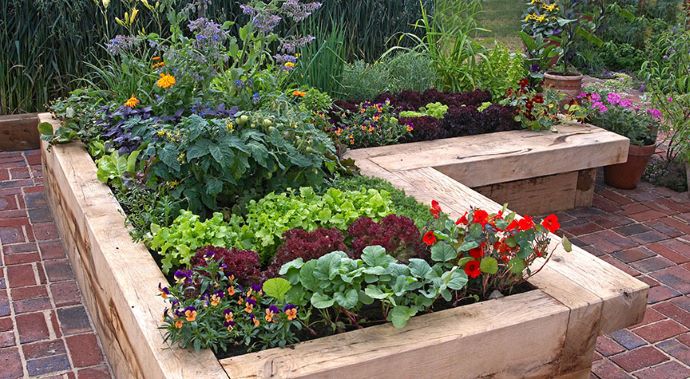These days, there seems to be a conscious shift towards understanding the role of nature in maintaining our health and well-being. With increasing access to information about superfoods, natural remedies, and alternative medicines, people are starting to recognize the potential of edible plants to change our health landscape for the better. We’re no longer relying solely on mass-produced and processed food items that may not always provide us with the necessary nutrients.
Gone are the days when gardening was only seen as a hobby or source of aesthetic pleasure as a thriving outdoor oasis. Today, it holds a much deeper purpose – promoting nutritional health and well-being through the cultivation of our own produce. This trend has been increasingly observed in urban areas, where people are turning even the smallest of spaces into their own little edible gardens.
Why Should You Grow Your Own Produce?

While the concept of growing your own produce may seem like an interesting and fun idea, it goes beyond just that. In fact, creating your own edible plant garden can have a significant impact on various aspects of our lives, including:
Promotion of Nutritional Health and Well-Being
When you grow your own produce, you have complete control over the use of fertilizers and pesticides. This means that you can avoid harmful chemicals and ensure that the fruits and vegetables you consume are free from any toxins. Many mass-produced food items contain preservatives and pesticides that can have adverse effects on our health in the long run. When you take control of the cultivation process, you can prioritize your health and well-being by producing organic and nutritious food.
Additionally, having access to fresh produce straight from your garden means that you can consume fruits and vegetables at their peak nutritional value. This is not always the case with store-bought produce, which may have travelled long distances and been stored for extended periods.
Contribution to Sustainable Agriculture and Food Security
As our global population continues to grow, the demand for food also increases. By making your own edible plant garden, you can contribute to sustainable agriculture by reducing the need for mass production and transportation of food. This means that you’re not only taking care of your health but also playing a role in ensuring food security for yourself and others.
You have a greater sense of control over the quantity and quality of food you produce, making it less likely for you to contribute to food waste. Additionally, in times of crisis or natural disasters, having your own source of fresh produce can be a lifesaver. When there’s less reliance on mass-produced items, the potential for food shortages decreases.
Support for Biodiversity and Ecosystem Balance
Growing a variety of edible plants in your garden can also support biodiversity and ecosystem balance. By planting different species, you’re providing habitats for beneficial insects, birds, and other wildlife. This helps to maintain a healthy ecosystem that is essential for the survival of all living beings.
As you cultivate your own produce, you’ll also learn about crop rotation and the importance of diversity in sustaining healthy soil. This knowledge can be applied in larger-scale agriculture practices to support biodiversity and maintain a balance in our ecosystems.
Potential Source of Medicinal Properties

Many edible plants have medicinal properties that can be beneficial for our health. By growing these plants in your garden, you have easy access to natural remedies that can help with various ailments. For example, herbs like cilantro, rosemary, and chamomile have anti-inflammatory properties and can aid in digestion.
You can choose which items you want to grow based on your specific health needs and have the satisfaction of knowing that they were grown without any harmful chemicals. This can greatly benefit those who are looking for natural alternatives to traditional medicine, as well as give them access to a constant and fresh supply of these plants.
Enhancement of Culinary Diversity and Taste
When you open up your garden to the possibility of growing different types of edible plants, you’re not only expanding your culinary options but also enhancing the taste and flavour of your meals. Homegrown produce is known for its superior taste and freshness compared to store-bought items.
You get to decide which items you want to incorporate into your diet. This allows for a diverse range of flavours that can enhance the overall taste of your meals. You may also discover new favourites and experiment with different recipes using your homegrown produce.
What Edible Plants Can You Grow?
The options are endless when it comes to edible plants that you can grow in your garden. Some of us have limited space, while others have ample room to experiment. Either way, here are some common categories of edible plants that you can consider growing:
Herbs and Spices
Whether you have a small windowsill or a large garden, herbs and spices are easy to grow and add flavour to any dish. Some popular options include basil, mint, thyme, oregano, and ginger. All of these can be grown in pots if you have limited space or directly in the ground if you have a larger garden. You can then dry or freeze them to use in your cooking throughout the year.
Fruits and Vegetables

From strawberries to tomatoes, growing your own fruits and vegetables can be incredibly rewarding. These plants require more space and attention, but the result is worth it. They’re quite versatile, and you can choose which varieties to grow based on your preferences. Some popular options include tomatoes, cucumbers, carrots, peppers, and berries.
Grains and Nuts
While grains and nuts may require more space and resources to grow, they are a great addition to any garden for those who have the means. Examples of grains you can grow include wheat, oats, and quinoa. On the other hand, nut trees such as almonds, walnuts, and hazelnuts can produce a bountiful harvest for years to come. These plants take longer to grow and require patience, but their nutritional value and sustainable yield make them a worthwhile addition to any garden.



